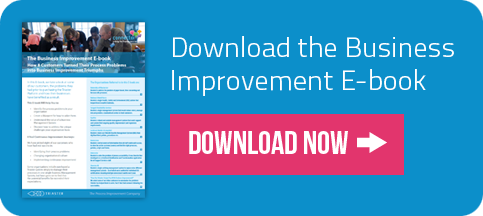The administration of universities and the way education is being provided has shifted in recent years to the adoption of business process improvement principles that were historically the domain of manufacturing companies and, more recently, the service industry.
This focus has seen some noticeable changes to the delivery of education services such as viewing students as customers and a noticeable commitment to programmes that improve quality and efficiency.
Universities were slow to adopt process improvement because it meant approaching the institution with a business mentality rather than through the lens of an education service provider. Today we know universities can be both an institution that cares about its students and an organisation making business decisions that improve efficiency and save money.
After all, the process approach to business improvement revolves around Deming's revolutionary 14 points, the focus being that increasing quality would help the company improve efficiency, improve the product and the way that product is created - which would in turn also improve the customer experience. In short, quality helps everybody.
It's little wonder therefore, that many universities that I have spoken with have primarily used Lean solutions to improve their business processes - whether directly or indirectly.
Taking a Look at 8 Different Universities and Their Culture of Continuous Improvement
Because of this improvement shift in university culture, I decided to look at the improvement initiatives of a range of universities to see just how universities are tackling the process improvement problem.
The Universities I will be looking at in this article are:
- University of Aberdeen
- University of Essex
- University of Exeter
- University of Deakin
- University of Leicester
- Miami University
- University of Sheffield
- University of South Carolina
Methodologies for University Improvement
Bringing a business mindset into the higher education sector can be a rather complex endeavor. This is why it matters greatly to choose the right business process improvement methodology for each individual university.
In 2016, the Universities and Colleges Information Systems Association (UCISA) published their best practice guide on university process improvement with the title 'Establishing Process Improvement Capabilty in an HE enviroment'.
Not only did they study how different institutions of the higher education (HE) sector implemented positive change but also which continuous improvement methodologies were used. After conducting a UK-wide survey in the HE sector, the UCISA concluded that
"the UK higher education sector is currently using a variety of approaches and methodologies to establish capability. The predominant sector approaches are Lean and six sigma, with the business process review (BPR) process in second place. It is clear that institutions are mainly taking a mixed model approach to improvement".
The following table of methodologies used by institution (UCISA) is able to visualise these findings very well. Predominantly, the HE sector appears to use Lean (exclusively and in conjunction with Six Sigma) and BPR:

How Have These 8 Universities Harnessed Continuous Improvement?
University of Aberdeen, UK
The University of Aberdeen was founded in 1495 by William Elphinstone, Bishop of Aberdeen and Chancellor of Scotland, and is therefore Scotland's third oldest and the United Kingdom's fifth oldest university.
Using the Lean methodology, the Business Improvement Team is tasked with continuous improvement at the University of Aberdeen:
"The function of the Business Improvement Team is to facilitate and catalyse, remove barriers, and help groups work better together, with the overall aim of improving the university for students, staff and other partners."
In doing so, the Business Improvement Team seeks add value and cut waste by following these four simple rules:
- Adding value to everything we do and removing unnecessary burdens.
- Continuously looking for ways to improve.
- Always remembering who the beneficiary is of the work.
- Employee-led improvements (bottom up, not top down).
University of Deakin, AUS
With more than 40 years of experience, the University of Deakin is one of Australia's best higher education institutions. Located in Melbourne, they are known "as a globally connected university, with five popular campuses [...] and technology-rich learning centres".
Excellent universities require excellent business process management skills, which is why a Process and Performance team was set up at the University of Deakin. One of their predominant goals: to build and sustain BPM capability with a focus on people, process and necessary tools.
According to Janet Green, Project Manager at the University of Deakin, they there was great demand for continuous improvement at Deakin: "We knew there was a huge appetite for process improvement at Deakin. We knew that Process Owners had a clear vision of ‘what’ they wanted to achieve."
The To Be processes that were desired by staff and process owners are similar to the ones at other universities :
- Increased customer satisfaction
- Faster processing times
- Fewer transactions
- Fewer errors
- Increased staff satisfaction
With the goal in mind to 'demystify BPM', the Process and Performance team set out to develop lean process improvement methods that required minimal training. They developed a simple 5 step ‘Process for Process Management’ programme, which has proven to work well in higher education process improvement. By means of this strategy, the University of Deakin has developed a simple method for:
- Assessing process value and deciding where to focus improvement effort
- Simple methods for discovering and communicating processes
- Checklists for reviewing processes
- Governance for transforming processes

University of Essex, UK
The University of Essex's continuous improvement website greets its visitors with the following sentence:
"The right people continuously searching for the simplest and smoothest process, in order to meet customer needs perfectly"
Founded in 1964, the University of Essex has moved towards a continuous improvement and change management mindset in order to improve their rankings as well as the overall student experience.
The Strategic Projects Office (SPO) handle all continuous improvement projects at the University of Essex. This includes facilitating events as well as the thorough training, mentoring and supporting of staff, who are then encouraged to deliver their own change improvements.
Achieving change and training staff to do the same is a well-organised and structured undertaking at the University of Essex: "the core CI Programme for the year is developed and approved through the Project Coordination Group (PCG) and centres around areas that will help to deliver the University's strategic aims".
The University of Essex's continuous improvement programme for 2017-2018 includes the following core topics:
- Registration
- Scholarships and Bursaries
- Admissions process for disabled students
- 28 Day Rule
- Timetable Teaching changes
- Exam Boards
- Extenuating Circumstances
- Ethics process for student projects
- Feedback forms and use of FASER
- eMentoring
- New and temporary staff starters
- Staff on short term contracts
The Strategic Projects Office aims to improve the above focus areas through the application of Lean principles. These are carefully broken down into five core points:
- Who are the customers of a process, and what value do they want from it
- Understand and map the current process and where the value is delivered
- Create flow in the process and remove unnecessary wastes
- Ensure the process is driven by customer demand
- Continuously identify opportunities for further improvement
In general, the Strategic Projects Office at the University of Essex centers their continuous improvement initiatives around two key points:
- Continuous Improvement toolkit
- a range of templates, tools and guides regarding continuous improvement are readily available for all Essex users and can be used as resources for change management
- One Stop Shop Guide
- as a 'go to' guide for project managers and all other staff concerned with continuous improvement, this guide is meant to be used when working on a project
- its particular design allows users to "easily dip in and out", depending on their experience and job role
- the guide comprises individual documents, examples and templates, further reading as well as online training and video tutorials
University of Exeter, UK
Formed in 1995, the aim of the University of Exeter is to "built on a strong partnership with its students and a clear focus on high performance". With that in mind, the University of Exeter focuses on a strong foundations of leadership, governance and management.
With several successful continuous improvement projects already completed, one of their current projects is called 'Lean Rapid Improvement Events (RIE)'.
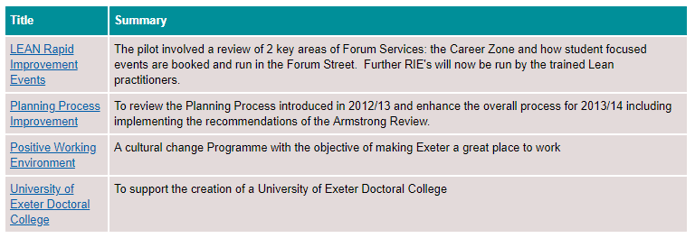
The goal of Lean RIE is to introduce a "customer focused, efficiency based culture" through empowering staff. Lean RIE "gives front line staff new skills, empowers them to make decisions and gives them a new team based way of working". RIE is designed to achieve improvements within smaller operational units or areas. It is shorter than the other continuous improvement initiatives and the event itself usually lasts from one to five days.
Other continuous improvement projects include the Lean Exeter strategic initiative, which lasts about six months and typically focuses on rendering complex processes more efficient. However, "both approaches use the same Lean tools and approaches in order to establish a new way of thinking and working for all those involved".
University of Leicester, UK
Founded as Leicester, Leicestershire and Rutland University College in 1921, the Leicester University site was donated by a local businessman, Thomas Fielding Johnson. In 2018, the University of Leicester uses their own unique approach to BPM excellence:
"We are building a ‘Leicester approach’ to continuous improvement which uses a range of tools that we have learned work well in at Leicester, all underpinned by a generous helping of common sense."
Rather than focusing on one single process improvement methodology, the Continuous Improvement Team prefers to remain flexible and work "in a number of different ways including facilitation of focused pieces of work, training and development, or providing a ‘guide on the side’".
This flexible approach to continuous improvement has had several benefits: one of their past projects concerned process improvement within the HR Recruitment - with successful outcomes. The Continuous Improvement Team made sure that all HR staff mapped out their current As Is processes and also organised focus group meetings with hiring managers in order to identify their processes and process issues. In this case, the Continuous Improvement Team was able to unveil that hiring managers were interested in more control when hiring staff, and that the overall processes were to complex and could be simplified.
In the end, the team "decided to make two changes: they introduced a recruitment plan which put all the recruitment information in one place to ensure clarity for the hiring manager, and they also ensured interview details were included on the shortlisting grid so that candidates could be invited more quickly".
This decision has since significantly reduced business waste, especially the time spent responding to chases and queries. The changes also ensured more control for managers when hiring new staff.
The University of Leicester serves as a good example that it is possible to adopt a flexible approach towards the different continuous improvement methodologies and still achieve very successful results.
Miami University, US
Miami University, founded in 1809, was named the most efficient U.S. national university by U.S.News in 2017.
Despite the fact that Miami University is first and foremost an educational institution, the Director of Lean Initiatives Alfred Ryan and his team managed to achieve employee buy in and were able to successfully introduce their employees to Lean Business Management.
According to Alfred Ryan, the recipe for success was a Lean certification programme:We have over 3500 employees who have been introduced to Lean through training, participation in our Lean Fair, member of a Lean team and participating in our certification program (200 enrolled and 65 certified Lean Leaders).
By means of a clear organisational structure of lean process improvement, they managed to get everyone on board and engage all university divisions in Lean Initiatives.
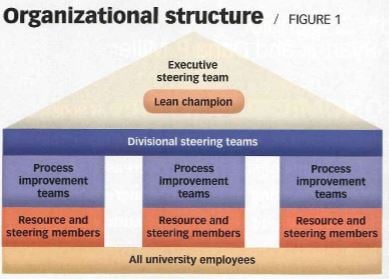
Most importantly, the Miami University Lean Inititatives team practiced continual improvement for 9 years through 'evolution' and not 'revolution'.
University of Sheffield, UK
As a member of the Russell Group of Leading UK Research Universities, the University of Sheffield is rated 75th in the world based on excellent teaching and research. In order to get there, the University's Process Improvement Unit had to continuously work on achieving more effective and efficient University processes. This way, more of the resources "can be spent on learning, teaching and research".
Using the Lean methodology, the University of Sheffield's Process Improvement Unit implements the two Lean Fundamentals as well as the five Lean Principles which are visualised below:
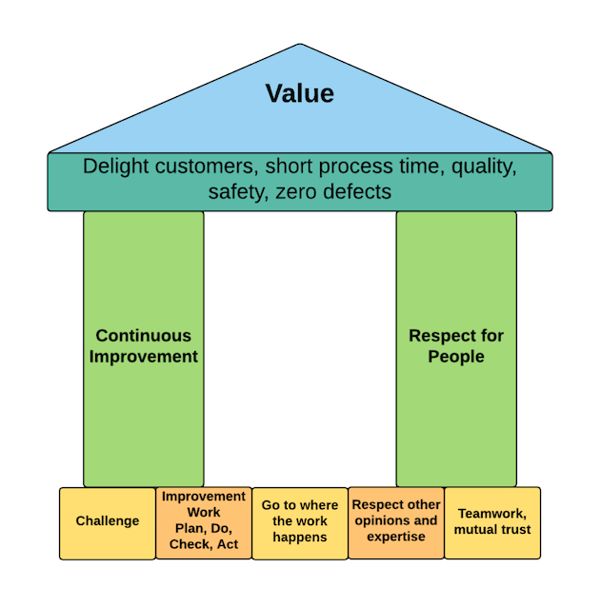 How do precisely did they implement the Lean methodology? Just like other universities, the University of Sheffield also uses the Plan Do Check Act Model, This way, the impelementation of continuous improvement remains a structured and well-monitored undertaking:
How do precisely did they implement the Lean methodology? Just like other universities, the University of Sheffield also uses the Plan Do Check Act Model, This way, the impelementation of continuous improvement remains a structured and well-monitored undertaking:
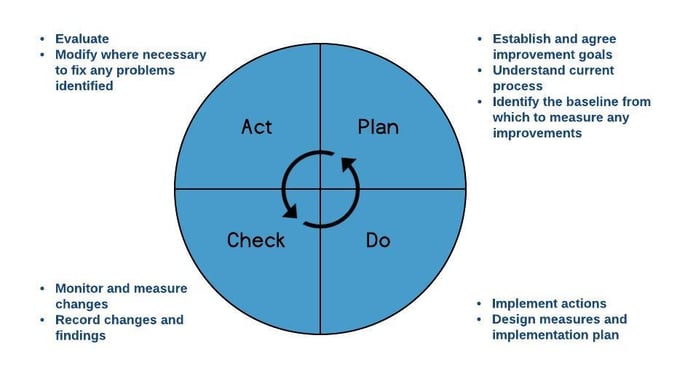
University of South Carolina, US
Nathan P. Strong, Director of Organizational and Professional Development at the University of South Carolina, takes continuous improvement seriously and has lead several successful Kaizen improvement projects. He describes the initial reasons for undertaking the process improvement project as follows:
"I initiated the Lean process here at USC 18 months ago. The purpose was two-fold:
- We have grown enrollment in the past several years and that growth has challenged many of our work processes. They simply needed to be looked at to determine where the waste was located in the processes so that we could become more efficient.
- The focus has been to improve the management of our workforce by vigorously training our managers and supervisors. However, we realized that having good people, even if they are fairly well-managed, working in bad processes is a recipe for failure. Put a good person in a bad system and I’ll bet on the system almost every time."
After spending five years trying to improve the work environment at the university of South Carolina, the Professional Improvement team took managed to implement lean process improvement successfully.
How Universities Bring a Business Mentality to Institutional Thinking
Implementing a business mentality at institutions that are predominantly concerned with providing higher education can be particularly challenging. While the following examples confirm this theory, they will also teach us that it is not impossible.
These following examples show that successful university process improvement depends on continuous employee engagement and staff-led initiatives.
University of Aberdeen, UK
The University of Aberdeen's Business Improvement Team focuses specialises in employee-led improvement projects, and designed specific training sessions to increase employee engagement in continuous improvement.
Through continuous employee engagement, the continuity of the project's implementation is guaranteed. In order to involve and educate employees about continuous improvement, the Business Improvement Team offers several staff training seminars and workshops:
- Learn Lean at Lunch:
- "The Business Improvement Team are facilitating lunchtime "taster" sessions designed to provide an overview of Lean methodology and a brief insight into the tools and techniques used by the Business Improvement Specialists."
- Lean for Higher Education:
- "Our two-day training course, recognised by the Institute of Leadership and Management as a Development Programme, is designed to provide in-depth training in Lean methodology as it applies to the Higher Education sector, to further knowledge and expertise of university staff."
- Lean for your Team:
- "Tailored lean training courses and workshops:
- Provide teams with exactly the right training to suit their needs.
- Oriented towards the application of particular lean tools and techniques.
- Practical focus, using case studies and linking to implementation activities
- Implementation support.
- From 2 hours to a series of sessions planned over a longer period."
- "Tailored lean training courses and workshops:
The feedback is overwhelmingly positive:
Lean for HE Development Programme, April 2016:
"I was worried beforehand that I would find the course challenging and jargon heavy - it was quite the opposite and I am very pleased I attended. A light bulb moment for me!"
Lean for your Team, March 2016:
"Some great ideas to help reporting on my projects regarding visual reporting (A3 reports, burndown charts etc). I found the event, interesting, informative, engaging and challenging. The day was a good mix of activity (we weren't left staring at a screen being lectured at all day)!
I'll endeavour to incorporate LEAN principles into my working practices. Particularly process flow mapping."
University of Exeter, UK
According to the University of Exter's Strategic Improvement team, the immediate benefits of Lean improvement initiatives include the following:
- Enabling quick change that will benefit customers immediately
- Empowering staff to actively contribute to a change in culture
- Breaking down silos and creating an understanding of the end to end process
- Equipping staff with tools and techniques that they can transfer into their day to day job
Employees who take part in the improvement and change initiatives usually also acquire important skills to help sustain continuous improvement projects:
- Meeting management
- Facilitation
- Process mapping - both current and future state
- Influencing skills - MBTI, giving and receiving feedback, listening, dealing with resistance to change
In addition, the Change Team also developed staff training courses, including "Growing your practical project management skills" as well as "Managing others through change". This way, they can ensure that staff acquire valuable skills to stand on their own two feet regarding future continuous improvement and remain involved with current projects.
University of Sheffield, UK
In order to implement a business mentality in higher education, the University of Sheffield's Process Improvement Unit relies on a well-structured programme.
The usual process improvement project at the University of Sheffield will therefore follow the outline below:
- Request: after a process issue is identified, the Process Improvement Unit is contacted
- Scoping: at a first meeting, the scope of the project is determined and the project improvement team is put together
- Planning: at the planning meeting with the whole team all necessary data is gathered and a timeline is set up. The team then designs a first high-level AS-IS process map
- Design/Redesign: a 3-5 day process improvement event is held and TO-BE processes are identified, followed by a list of actions that have to be carried out.
- Implementation Stage: the Process Improvement Unit work with the project team over the next 3-6 months to assist with the progress as well as any problems
The typical process improvement as described above has also been visualised by the University of Sheffield's Process Improvement Unit:

In order to demonstrate the successful outcomes of their continuous improvement strategy, the University of Sheffield also published several case studies, which you can find here.
In addition, rolling out the Lean methodology across the University has had a positive impact on employees. According to Michelle Barraclough, Print and Design Solutions, Lean has encouraged her to make changes everyday:
"Being involved in a PIU project makes you think about your everyday processes and changes your way of thinking. Being involved gave me the motivation to make changes and I felt my enthusiasm was passed onto my colleagues."
University of South Carolina, US
On the road to lean university process management many obstacles have to be overcome. One of the major problems encountered by the University of South Carolina was their lack of staff resources. Not many staff were trained to teach and facilitate lean improvement activities - meaning that the team had to start from scratch and learn everything themselves.
The next obstacle was achieving employee buy-in. Convincing busy university staff that it is worth their time to commit some time to work through the Kaizen process was difficult, especially regarding the fact that some university departments were already understaffed. According to Nathan P. Strong, Director of Organizational and Professional Development at the University of South Carolina, "committing 4-5 days to a Lean project can be a hard sell".
However, once staff had participated in the lean improvement seminars and workshops, they were able to see the efficiency and efficacy advantages of the lean university undertaking.
One of the remaining challenges is concerned with getting people to think in terms of process improvement and enable them to select promising projects self-sufficiently. Working at an educational institution, "many people are 'in the weeds' and have a hard time thinking big picture and identifying the opportunities for improvement." However, this issue can be solved through follow-up training and regular team meetings regarding continuous improvement developments and projects.
What Are the Results?
Even though the journey matters, the road of continuous improvement eventually has to lead to tangible results. These can include achieving ROI, cutting or transforming processes that waste time and money, turning a heavy paper-based system into a mobile solution, or streamlining and automating business processes.
In order to show what Lean University Management can achieve, I have selected two of the most astonishing results.
Miami University: Completion of 1300 Lean Projects
The thorough application of Lean principles rendered the University of Miami's processes more efficient than ever before. The success of Miami University did not go by unnoticed: the University was named the most efficient U.S. national university by U.S.News in 2017. Since the article was published, Alfred Ryan, the Director of Lean Initiatives at Miami Universities said that they have doubled their deliverables to $58 million and have completed over 1300 Lean Projects.
The Lean Learning report on Miami University reveals an impressive collection of continuous improvement results:
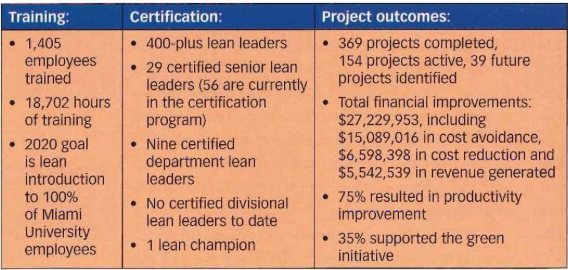
University of South Carolina: Streamlining Communication
According to the Nathan Strong, the Organizational and Professional Development team have had several well-documented Kaizen projects that were successful. While most of the continual improvement projects are published on their website, especially the most recent (not yet published) campaign reveals state-of-the-art lean university process management.
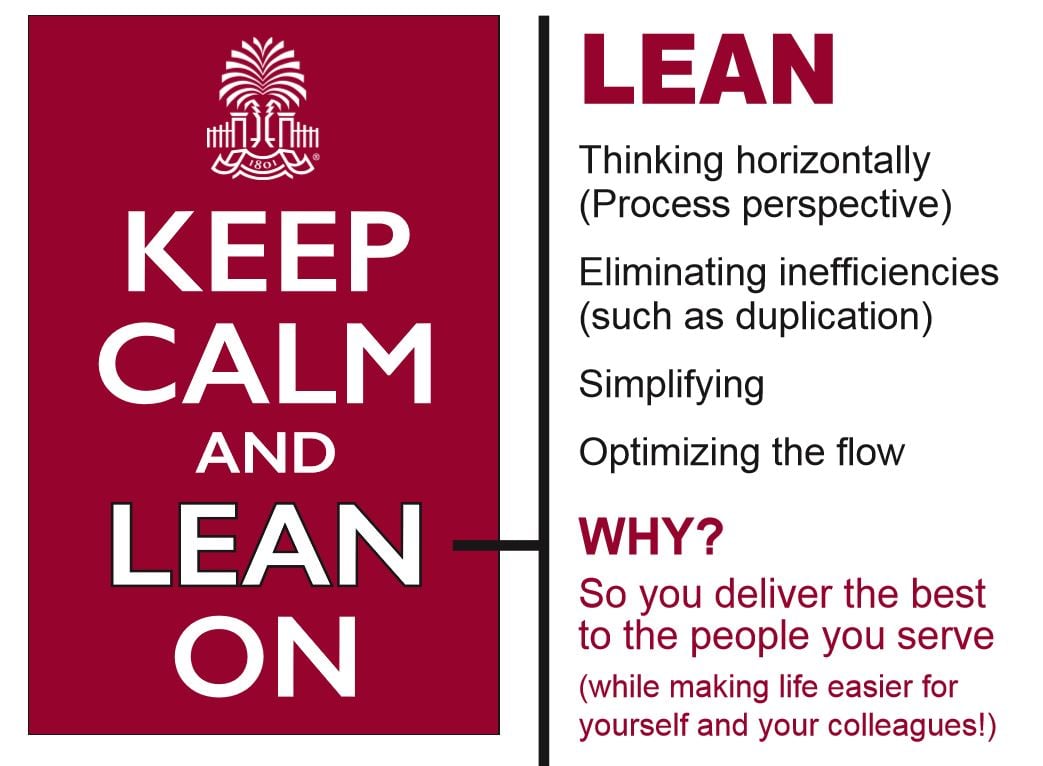
With the goal to cut business waste and and increase student success, Nathan Strong and his team set out todevelop a centralised, comprehensive plan for first-year communications with students. This way, the Organizational and Professional Development team will manage to streamline and standardise their student services - and thereby render them more accessible and user-friendly. 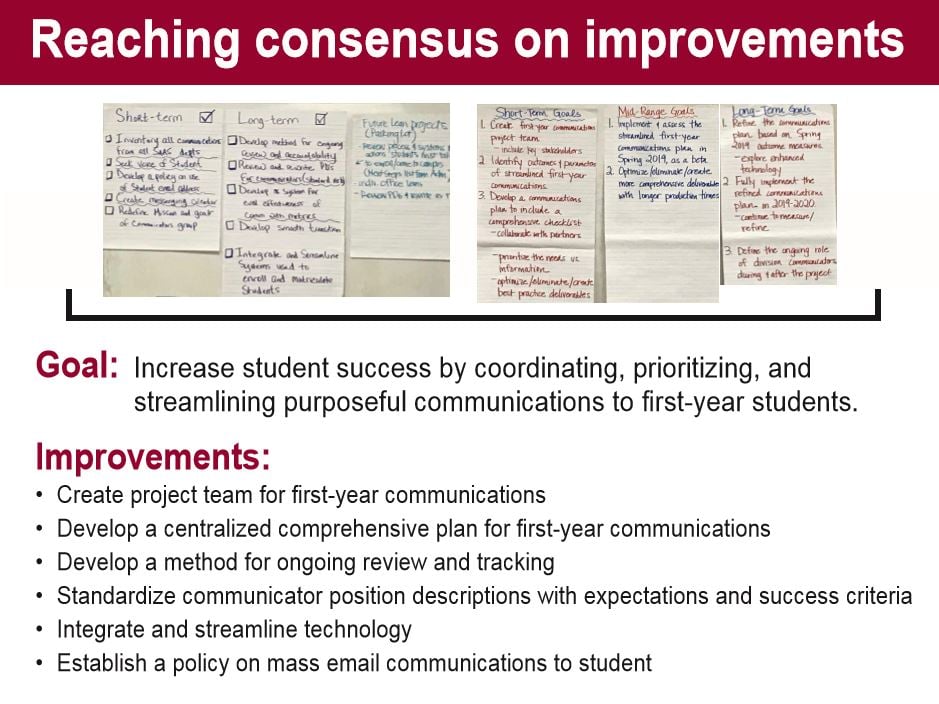
If you're interested in learning more about continuous improvement, feel free to have a read of our Business Improvement E-book below:
Related articles:
What is Continuous Improvement? A Simple Guide
Process Mapping Checklist: How to Make an Accurate Process Map
What is Continuous Improvement? A Simple Guide
Written by Lynn Dudenhoefer
Lynn joined Triaster in November 2017 as the new Inbound Marketing Executive. Prior to her work with Triaster, Lynn worked in content management and studied at the University of Oxford. In June 2018 Lynn returned to Germany with her husband Brad.
